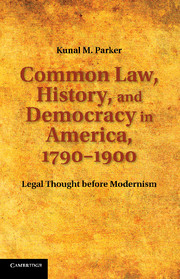5 - Time as Law
Common Law Thought in the Mid-Nineteenth Century
Published online by Cambridge University Press: 03 May 2011
Summary
Laws Underlying Laws
The American Civil War is rightly considered a watershed in American history. More than three decades ago, Morton Keller described this watershed in ways that continue to resonate: “On its far side is the young Republic: agrarian, decentralized, living still under the spell of the Revolution and the Founding Fathers, burdened by slavery but exhilarated by the lure of the great undeveloped West. And on its near side is modern America: a nation of cities, factories, immigrants; a society whose controlling realities are not simplicity and underdevelopment but complexity and maturity.”
Americans who lived through the Civil War themselves wrote – and how could they not? – as if they had experienced something transformative. Although they did not represent the experience, as Keller did, in terms of an accession to “modernity,” they prefigured Keller's observation that the country had lost its youthful innocence and been catapulted into an adulthood marked by complexity and compromise. In The American Republic (1865), the Roman Catholic social and political thinker Orestes Brownson wrote that the War had brought the country “to a distinct recognition of itself, and forced it to pass from thoughtlessness, careless, heedless, reckless adolescence to a grave and reflecting manhood.” Fourteen years after Appomattox, Henry James struck a similar note. Observing that the Civil War had brought America's naive sense of “its immunity from the usual troubles of earthly empires” to an end, James found that Americans had acquired “a certain sense of proportion and relation, of the world being a more complicated place than it had hitherto seemed, the future more treacherous, success more difficult.”
- Type
- Chapter
- Information
- Common Law, History, and Democracy in America, 1790–1900Legal Thought before Modernism, pp. 168 - 218Publisher: Cambridge University PressPrint publication year: 2011



